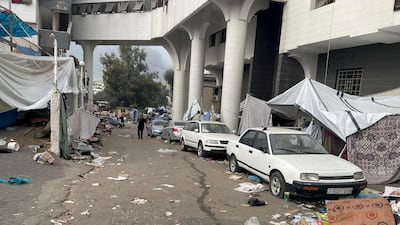The global economy is likely to be negatively affected if the Israel-Gaza war, which is in its sixth week, evolves into a broader international conflict with many countries involved, according to a new report.
Equities could sell off while high-quality bonds would rally, Daniel Murray, deputy chief investment officer and global head of research at EFG Asset Management, said.
Defence stocks would also do well, while “gold and the Swiss franc could also perform relatively well given their status as safe-haven assets”, Mr Murray said.
The prospect of the current situation spreading is “remote” at this stage, the report said.
The Israel-Gaza war started on October 7 with the sudden attack by Hamas on southern Israel that led to the killing of about 1,200 people, with 240 taken hostage.
Israel retaliated with air strikes and a siege of the Gaza enclave, with the Palestinian death toll currently at about 11,500. Fighting also broke out with Hezbollah in Lebanon, with the death toll in the Levant nation reaching 77 as of November 13, according to its Health Ministry.
A greater number of Middle East countries can get involved if the conflict drags on and it could impact energy markets, the report said.
“With global energy supplies already disrupted due to the war in Ukraine, it would be harder to offset any shock to Middle Eastern oil and gas exports,” Mr Murray said.
“Oil and gas prices could rise and there may be talk of stagflation. Central banks could become more hawkish and government bonds could potentially sell off. Equities may struggle in this scenario.”
Oil prices rose initially at the outbreak of the war, but fell in the subsequent weeks on demand concerns as high inflation rates and tightening of the monetary policy continued to impact global economic growth.
Last month, the World Bank predicted oil prices could rise to $157 a barrel in the near term if an escalation of the Israel-Gaza conflict results in a big crude supply disruption in the Middle East.
If more countries across the region, including Lebanon, Jordan, Syria as well as Iran and Yemen (directly or indirectly) are involved in the war, it will “clearly represent a greater risk to markets and one would expect to see an increase in volatility. Tail risk hedging would likely become more expensive in such a situation”, Mr Murray said.
There is expected to be a “minimal market impact”, if the conflict remains almost exclusively confined to Israel and Gaza, and other Middle Eastern countries largely avoid getting involved other than occasional skirmishes, EFG said.
The war is most likely expected to be largely contained to the Israel-Gaza borders, according to Standard Chartered Bank.
However, the lender anticipates that global growth will suffer amid the continued war and escalation.
“If I were to break down our probabilities, I would say we see it as a 60 per cent probability that it stays contained to Israel-Gaza [borders] and within that 40 per cent remaining probability, it's split 25-15,” Eric Robertsen, managing director, global head of research and chief strategist of Standard Chartered, told a recent media briefing in Dubai.
In the escalation scenario, “we see a 25 per cent chance that it will stay within the Levant (region) and then there's the 15 per cent very fat tail of something broader happening”, he said.
“So … something really escalating beyond just a couple of hotspots, from there, I think the discussion is really uncomfortable,” he said. “What I mean by that is even though the 15 per cent is a low number, the impact on the region, the impact on energy supplies, all these things put together, the impact is quite large.”
Growth will be hit globally if the war continues and oil prices rise due to supply disruption, he said, echoing the EFG report.
“That story, by the way, is not just relevant here in the region, look at Asia, most of Asia, economies are oil importers,” Mr Robertsen said.
“India is a classic example, South Korea is another and if we were to see a conflict-driven surge in oil prices back to say $100 a barrel, I think most people's growth forecasts not only regionally but globally would probably suffer, a material downgrade.”




















